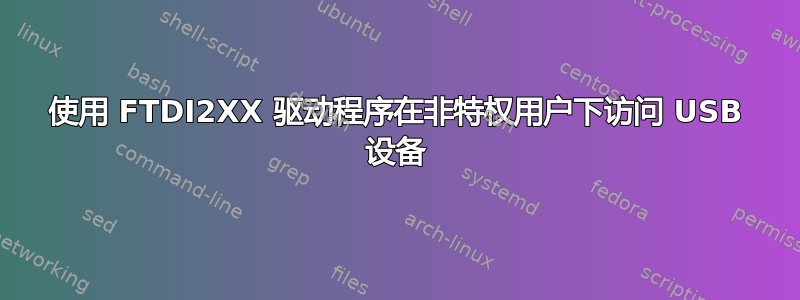
我正在尝试使用 libFtd2xx(版本:libftd2xx.so.1.3.6)驱动程序访问 USB 设备。
驱动程序链接:http://www.ftdichip.com/Drivers/D2XX/Linux/ReadMe-linux.txt... 测试所使用的设备功能简单的示例目录中的内容和下面提到的内容是执行期间的输出。
在 root 下
venkat:/opt# ./simple-dynamic
Device 0 Serial Number - 12Z9UXGV
Device 1 Serial Number -
Opened device 12Z9UXGV
在NON_特权用户下
venkat@venkat:/opt$ ./simple-dynamic
Error: FT_ListDevices(2)
在 ROOT 用户下:设备访问按预期工作。但是,当尝试在普通用户下执行它时,设备无法访问。
我相信这与某些许可有关。但无法度过这一关。
斯特雷斯·迪夫
根
open("/dev/bus/usb/001/005", O_RDWR) = 10
普通用户
open("/dev/bus/usb/001/005", O_RDWR) = -1 EACCES (Permission denied)
在运行此应用程序之前我确定的事情:
1. rmmod ftdi_sio (as super user)
2. chmod 0755 /usr/local/lib/libftd2xx.so.1.3.6
3. ln -sf /usr/local/lib/libftd2xx.so.1.3.6 /usr/local/lib/libftd2xx.so
也尝试向 UDEV 添加权限:
ACTION=="add", SUBSYSTEMS=="usb", ATTRS{idVendor}=="0403", ATTRS{idProduct}=="6014", MODE="0755"
请求一些指导来解决此问题。
源示例:
/* 打开最多 4 个设备的简单示例 - 写入一些数据然后读回。还显示了使用列表设备的一种方法。假设设备上有一个环回连接器,并且它们也有一个序列号*/
/*To build use the following gcc statement
(assuming you have the d2xx library in the /usr/local/lib directory).
gcc -o simple main.c -L. -lftd2xx -Wl,-rpath /usr/local/lib
*/
#include <stdio.h>
#include <stdlib.h>
#include <string.h>
#include <unistd.h>
#include "../ftd2xx.h"
#define BUF_SIZE 0x10
#define MAX_DEVICES 5
static void dumpBuffer(unsigned char *buffer, int elements)
{
int j;
printf(" [");
for (j = 0; j < elements; j++)
{
if (j > 0)
printf(", ");
printf("0x%02X", (unsigned int)buffer[j]);
}
printf("]\n");
}
int main()
{
unsigned char cBufWrite[BUF_SIZE];
unsigned char * pcBufRead = NULL;
char * pcBufLD[MAX_DEVICES + 1];
char cBufLD[MAX_DEVICES][64];
DWORD dwRxSize = 0;
DWORD dwBytesWritten, dwBytesRead;
FT_STATUS ftStatus;
FT_HANDLE ftHandle[MAX_DEVICES];
int iNumDevs = 0;
int i, j;
int iDevicesOpen;
for(i = 0; i < MAX_DEVICES; i++) {
pcBufLD[i] = cBufLD[i];
}
pcBufLD[MAX_DEVICES] = NULL;
ftStatus = FT_ListDevices(pcBufLD, &iNumDevs, FT_LIST_ALL | FT_OPEN_BY_SERIAL_NUMBER);
if(ftStatus != FT_OK) {
printf("Error: FT_ListDevices(%d)\n", (int)ftStatus);
return 1;
}
for(i = 0; ( (i <MAX_DEVICES) && (i < iNumDevs) ); i++) {
printf("Device %d Serial Number - %s\n", i, cBufLD[i]);
}
for(j = 0; j < BUF_SIZE; j++) {
cBufWrite[j] = j;
}
for(i = 0; ( (i <MAX_DEVICES) && (i < iNumDevs) ) ; i++) {
/* Setup */
if((ftStatus = FT_OpenEx(cBufLD[i], FT_OPEN_BY_SERIAL_NUMBER, &ftHandle[i])) != FT_OK){
/*
This can fail if the ftdi_sio driver is loaded
use lsmod to check this and rmmod ftdi_sio to remove
also rmmod usbserial
*/
printf("Error FT_OpenEx(%d), device %d\n", (int)ftStatus, i);
printf("Use lsmod to check if ftdi_sio (and usbserial) are present.\n");
printf("If so, unload them using rmmod, as they conflict with ftd2xx.\n");
return 1;
}
printf("Opened device %s\n", cBufLD[i]);
iDevicesOpen++;
if((ftStatus = FT_SetBaudRate(ftHandle[i], 9600)) != FT_OK) {
printf("Error FT_SetBaudRate(%d), cBufLD[i] = %s\n", (int)ftStatus, cBufLD[i]);
break;
}
printf("Calling FT_Write with this write-buffer:\n");
dumpBuffer(cBufWrite, BUF_SIZE);
/* Write */
ftStatus = FT_Write(ftHandle[i], cBufWrite, BUF_SIZE, &dwBytesWritten);
if (ftStatus != FT_OK) {
printf("Error FT_Write(%d)\n", (int)ftStatus);
break;
}
if (dwBytesWritten != (DWORD)BUF_SIZE) {
printf("FT_Write only wrote %d (of %d) bytes\n",
(int)dwBytesWritten,
BUF_SIZE);
break;
}
sleep(1);
/* Read */
dwRxSize = 0;
while ((dwRxSize < BUF_SIZE) && (ftStatus == FT_OK)) {
ftStatus = FT_GetQueueStatus(ftHandle[i], &dwRxSize);
}
if(ftStatus == FT_OK) {
pcBufRead = realloc(pcBufRead, dwRxSize);
memset(pcBufRead, 0xFF, dwRxSize);
printf("Calling FT_Read with this read-buffer:\n");
dumpBuffer(pcBufRead, dwRxSize);
ftStatus = FT_Read(ftHandle[i], pcBufRead, dwRxSize, &dwBytesRead);
if (ftStatus != FT_OK) {
printf("Error FT_Read(%d)\n", (int)ftStatus);
break;
}
if (dwBytesRead != dwRxSize) {
printf("FT_Read only read %d (of %d) bytes\n",
(int)dwBytesRead,
(int)dwRxSize);
break;
}
printf("FT_Read read %d bytes. Read-buffer is now:\n",
(int)dwBytesRead);
dumpBuffer(pcBufRead, (int)dwBytesRead);
if (0 != memcmp(cBufWrite, pcBufRead, BUF_SIZE)) {
printf("Error: read-buffer does not match write-buffer.\n");
break;
}
printf("%s test passed.\n", cBufLD[i]);
}
else {
printf("Error FT_GetQueueStatus(%d)\n", (int)ftStatus);
}
}
iDevicesOpen = i;
/* Cleanup */
for(i = 0; i < iDevicesOpen; i++) {
FT_Close(ftHandle[i]);
printf("Closed device %s\n", cBufLD[i]);
}
if(pcBufRead)
free(pcBufRead);
return 0;
}


